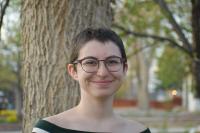You are here
Madison Swirtz
Colorado School of Mines
APS Education & Diversity Intern
American Physical Society
Final presentation
![]() Madison Swirtz Final Presentation.pdf
Madison Swirtz Final Presentation.pdf
Although many STEM fields have made significant progress towards gender and racial parity, physics has lagged significantly behind: women only make up 20% of the undergraduate physics degrees awarded yearly despite making up half of the population, and Black, Hispanic, Native American, and Pacific Islanders only account for 15% of undergraduate degrees awarded yearly despite these populations making up about 30% of the college-aged people in the United States. In the wake of COVID-19 and the Black Lives Matter movement, the question of how we will make physics more inclusive has been put at the forefront of the community’s conversations, and that question is still left largely unanswered. In my time at APS, I have learned a lot about where the culture of physics stands now, what structures are reinforcing this culture, and what work people have done and are doing to make physics a more inclusive place for everyone. This presentation explores what I learned this summer while working with APS Education & Diversity Statistics, attending the American Association of Physics Teachers conference and Physics Education Research Conference, and doing analysis on a survey from APS funded outreach programs.
I’m an incoming senior in Engineering Physics at the Colorado School of Mines in Golden, Colorado. My junior year, I did research in expanding the connections between quantum entanglement entropy and bulk spacetime, and I will be continuing that work my senior year. At my school, I have been an officer of SPS and the Society of Women in Physics for the last two years, and next year I will be an officer of Sigma Pi Sigma.
I didn’t start out college intending to be a physics major, but that quickly changed when I took my first physics class and learned about how wonderful our department is. I fell in love with physics and began going to every office hour, guest lecture, and club meeting I was allowed to so I could learn more. Community has been a cornerstone of my physics experience, and that’s something I want future generations of students to experience. The value of diversity is a proven fact, and I'm ecstatic to work with APS this summer and continue working to make physics a more inclusive place!

